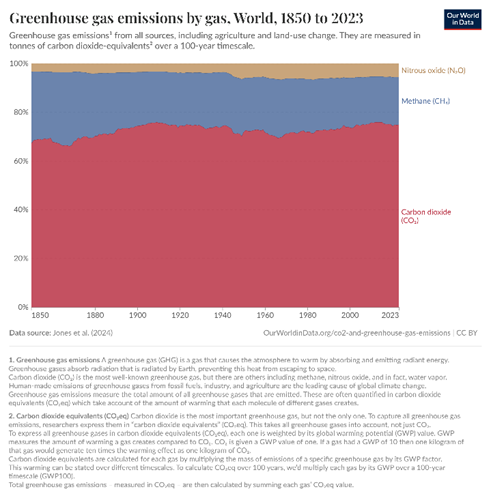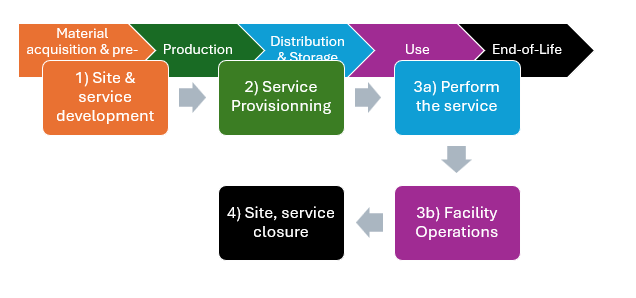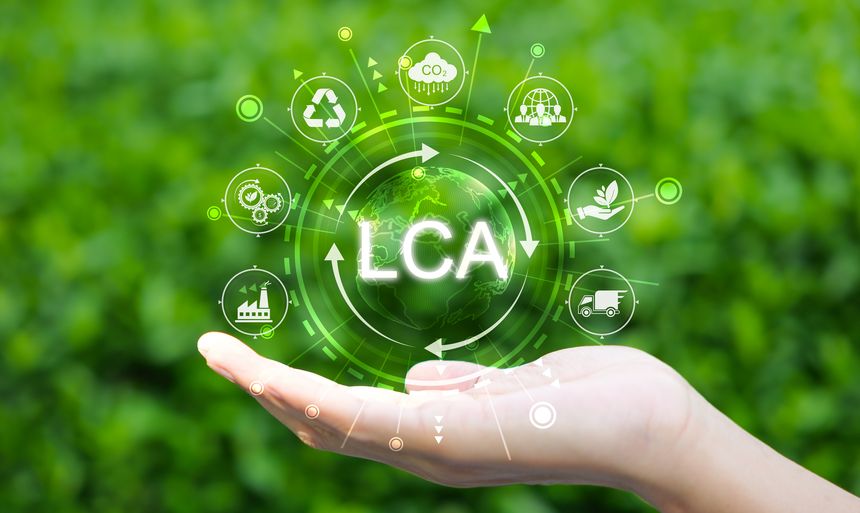What is LCA?
LCA, or life cycle assessment, is a structured method for evaluating the implications of products, processes, or activities. It aims to assess the impact of energy and materials used as inputs, along with associated emissions, mainly by identifying and quantifying opportunities for sustainable improvements. The quantification process helps clarify data (both primary and secondary) to estimate potential impacts. These impacts include both positive and negative estimates, although perceptions without LCA tend to focus more on negatives. The LCA results guide adjustments after the actual impacts are evaluated as either negative or positive, supported by both qualitative and quantitative data.
The LCA process involves four steps, beginning with defining the goals and scope. It includes establishing a clear purpose, system boundaries, functional unit, and impact allocation, followed by inventory analysis, impact assessment, and interpretation. Deciding on system boundaries and the functional unit is crucial, as it influences resource requirements. Boundaries may include Cradle-to-Gate, Cradle-to-Grave, and Gate-to-Gate.
What is Emission?
Emissions are harmful gases and substances released into the atmosphere by human activities and ultimately contribute to climate change. These gases include not only Carbon Dioxide (CO2) but also Methane (CH4), Nitrous Oxide (N2O), Hydrofluorocarbons (HFCs), and Sulfur hexafluoride (SF6), among others, each affecting global warming differently due to its varying potency.
As the image on the right illustrates, all efforts to reduce CO2 emissions are good news. The emissions are classified into three scopes to prevent generalisations and measure genuine progress with a shared understanding, regardless of industry or sector. Scope 1 includes direct emissions from the organisation; Scope 2 covers indirect emissions; and Scope 3 pertains to other indirect emissions.

Source: Ritchie, H., Roser, M., & Rosado, P. (2024, June). Greenhouse gas emissions. Our World in Data. https://ourworldindata.org/greenhouse-gas-emissions [ourworldindata.org]
Why LCA?
LCA functions as a tool within the 'E' pillar of Environmental, Social, and Governance (ESG). The ISO 14040 Life Cycle Assessment Standard defines it as: "compilation and evaluation of the inputs, outputs, and the potential environmental impacts of a product system throughout its life cycle."
From extraction to processing, manufacturing, use, and end-of-life or recycling, all stages require inputs of resources (materials and energy), resulting in emissions. Extensive information exists on how emissions impact climate change, acidification, eutrophication, land use, resource depletion, and other issues. Therefore, the significance of the LCA process lies in its ability to identify and quantify emissions, providing insights for mitigation through data science.
Is LCA applicability in the service industry?
LCA is well known in the manufacturing sector; however, it is less recognised in the service sector, which can lead to missed opportunities. While studying the topic during my sustainability coursework and researching it further, I created the image below to represent how traditional LCA (material acquisition and pre-processing to End-of-Life) applies to services. The four stages are colour-coded to show the connection: 1) preparing the site (construction, renovation); 2) service provision through acquiring resources for delivery (printers, vehicles, computers, desks, etc.); 3a) service delivery by performing the services within the business context; and 3b) facility operations (employees commuting to the offices for functions such as Human Resources, customer services, finance, etc.); and finally 4) site and service closure (switching lease to a new site, disposing of or relocating unused equipment, etc.). I believe this mapping aids understanding and highlights its relevance to the service industry, with a little imagination.

Finally, I also recommend the podcast where my colleagues share further insights into the LCA field.
Also, explore the wide range of services Intertek provides worldwide for LCA and sustainability.
- Life Cycle Assessment (LCA)
- Introduction to the principles of Life Cycle Analysis (LCA)
- Implementing Life Cycle Analysis (LCA)
- Life Cycle Assessments for Medical Devices | On-Demand Webinar
- Life Cycle Assessment for Manufacturers: Unlocking Sustainability
- From Fiber to Fashion: Simplifying Sustainability with Life Cycle Assessment(LCA) and Traceability












/Passle/5e4a7839abdfeb03584d01f6/SearchServiceImages/2026-02-16-20-54-01-203-699383e92a3147bfceee0000.jpg)

/Passle/5e4a7839abdfeb03584d01f6/SearchServiceImages/2026-02-09-20-02-11-944-698a3d43120a9705b5de07ff.jpg)
/Passle/5e4a7839abdfeb03584d01f6/SearchServiceImages/2026-01-12-19-21-10-475-696549a65262d0a2d84d8cc8.jpg)
/Passle/5e4a7839abdfeb03584d01f6/SearchServiceImages/2026-02-03-19-37-50-226-69824e8ed571d07845fdfbcf.jpg)